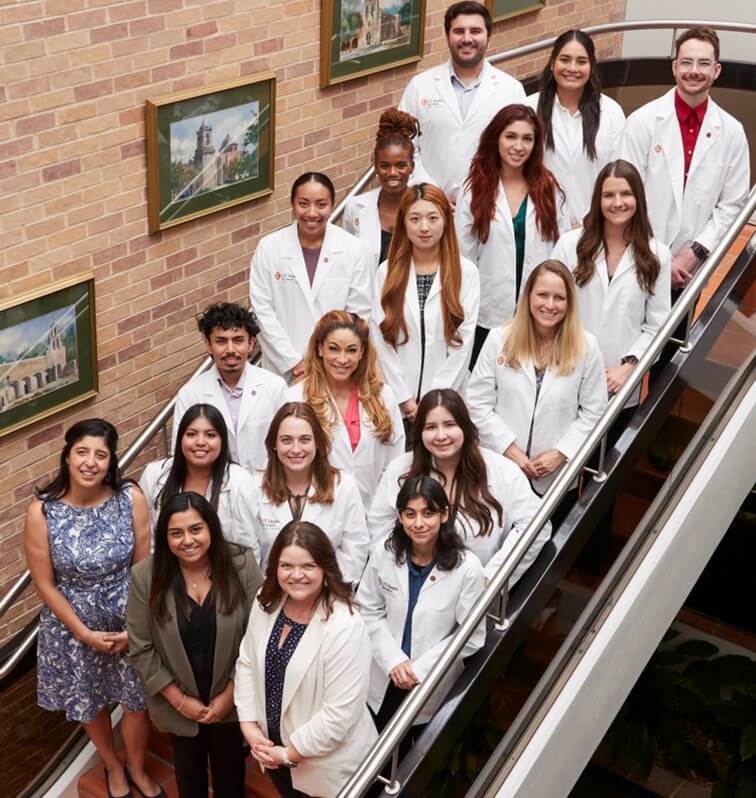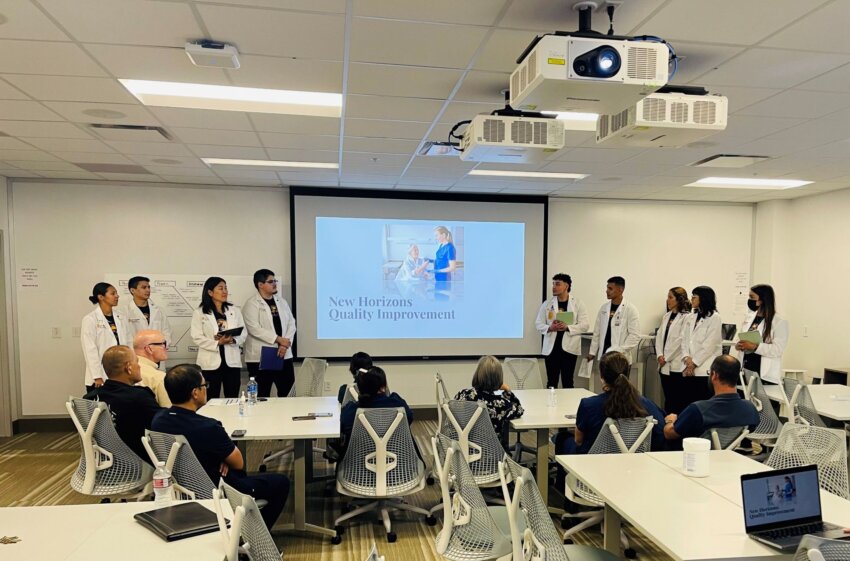Two research training programs at The University of Texas Health Science Center at San Antonio School of Nursing are introducing Bachelor of Science in Nursing students to skills and experiences most often reserved for nurses pursuing an advanced degree.
“Nurses make a big difference with hands-on patient care and they also play a crucial role in community health, shaping policies and driving discovery research and evidence-based practices,” said Sara Mithani, PhD, RN, assistant professor and program director.
The Summer Undergraduate Nursing Research Immersion Experience (SUNRISE) and New Horizons programs are dedicated to encouraging the holistic personal and professional development for undergraduate nursing students. The programs are funded by a U.S. Department of Education’s Developing Hispanic-Serving Institutions Program Title V grant, led by principal investigator Vanessa Meling, EdD, MBA, and co-investigators Mithani and Angela Watts, PhD, director for student success.
The grant, aptly named APOYO (Spanish), meaning support, embodies a comprehensive strategy to enhance the success of historically underrepresented and financially under-resourced nursing students. Central to the initiative, the programs include summer stipends for all student participants, coupled with support for travel related to research presentations.
“During both program experiences, nursing students have the opportunity to explore the diverse roles and responsibilities of a nurse researcher and nurse scientist through structured and experiential learning. The programs expose students to skills development, mentorship, experiential learning and professional career development opportunities
The SUNRISE and New Horizons programs are similarly designed in that each have a competitive selection process for a limited number of seats, however they differ in scope and duration. SUNRISE is focused on discovery research while the concentration of New Horizons is on evidence-based practice and quality improvement.
Discovery research

Based on each student’s individual interests, SUNRISE participants are matched with research faculty in the School of Nursing for an eight-week apprenticeship. The apprenticeship model offers students firsthand exposure to the inner workings of established research programs, providing hands-on experience in data collection, data analysis, research policies and procedures and interdisciplinary collaborations. Participants have the unique opportunity to be mentored by research faculty and engage in weekly research skills development sessions with Mithani and their cohort.
“These experiences are very similar to what a research fellow or PhD student would be doing,” said Mithani. “Through SUNRISE, scholars actively participate in their mentor’s research and are given the opportunity to publish abstracts and manuscripts with their mentor. They also showcase their summer experience and research findings through poster presentations at the School of Nursing Research Day, and some scholars will go on to present at local and national conferences.”
Due to the requisites built into the SUNRISE program, alumni participants are often positioned to graduate with a distinction in research.
Evidence-based practice and quality improvement
New Horizons is a one-week immersion program that was introduced in the fall 2023 semester. Through a partnership with University Health’s nursing education department, New Horizons participants have the unique opportunity to cultivate skills in evidence-based practice and quality improvement through hands-on experiential learning with nursing educators, unit leads or administrators. Students have the opportunity to observe quality improvement through ongoing initiatives that analyze processes, identify areas for enhancement and implement evidence-based strategies to enhance overall patient outcomes and health care delivery.
“This unique experience provides the students with invaluable insights that will distinguish them as proactive and forward-thinking professionals,” Mithani said. “This year, our students tackled the first portion of the quality improvement process by looking at medication administration on five medical surgical units. They completed a comprehensive analysis of existing processes and systems to identify areas for enhancement and optimize efficiency within the units but also at a hospital level.”
During daily learning sessions, participants learned different topics that included the function of the hospital environment, pharmacy access and even the language used for patient literature materials. Throughout the week, participants created a fishbone diagram that was presented to executive leadership, faculty and staff from the School of Nursing and University Health regarding their analysis.
“The New Horizons program is tailored to capture and provide exposure to experiences and skills similar to those of a student seeking a Doctorate of Nursing Practice. It is truly a unique opportunity for undergraduate nursing students,” Mithani said.
Holistic support
In addition to the mentorship of nursing research and program faculty, another layer of support surrounds each participant in both programs. Each is structured to promote regular interaction between undergraduate researchers with one another, graduate students and with members of the school’s Office of Student Success.
“We are focused on the students we serve,” said Watts. “More than 50% of our students identify as Hispanic or Latine, 38% are from financially under-resourced backgrounds and 38% are first-generation college students. Often, they are simply unfamiliar with the opportunities available to them. We expose students to those opportunities and provide support and resources to help them be successful. We are building a holistic nursing student success model through mentorship, academic support, financial literacy, and mental health wellness.”
The Office of Student Success provides tutoring and academic coaching services, professional development resources, support for student well-being and scholarship assistance.
“Word has spread among our students about how helpful these experiences are, not only academically, but students develop a strong sense of belonging,” Watts said. “With access to leaders in nursing, like Dr. Norma Martinez Rogers, Dr. Lixin Song and Dean Sonya Hardin, who are first-generation students themselves and come from similar communities, our students can see themselves represented in those who have ascended to leadership. It’s a powerful moment to identify with those we put in such high regard.”
To learn more about the SUNRISE and New Horizons programs or the services offered by the Office of Student Success, visit the School of Nursing’s website or email SONStudentSuccess@uthscsa.edu.


